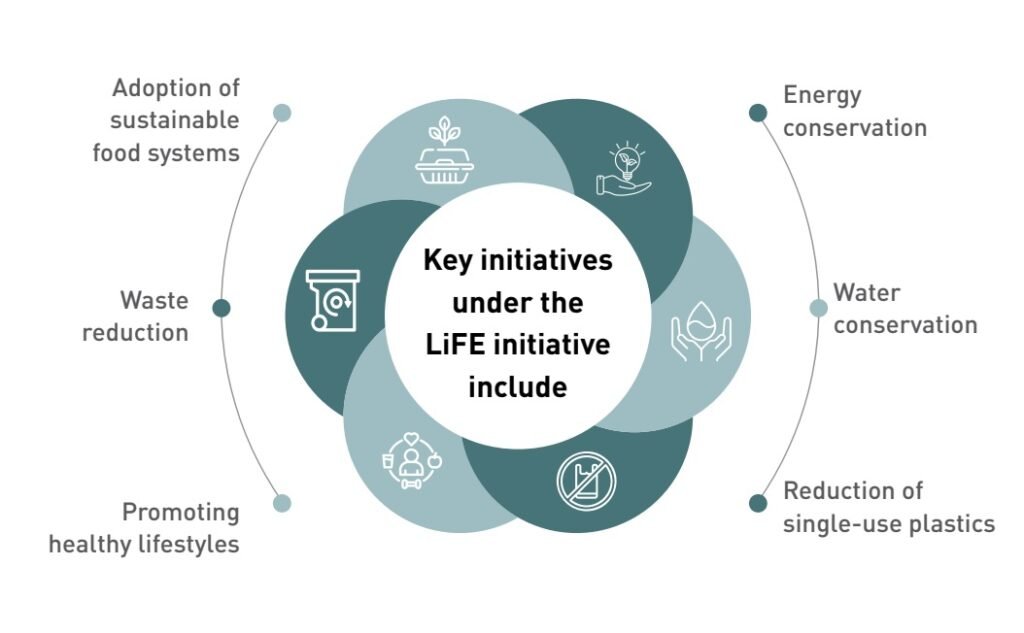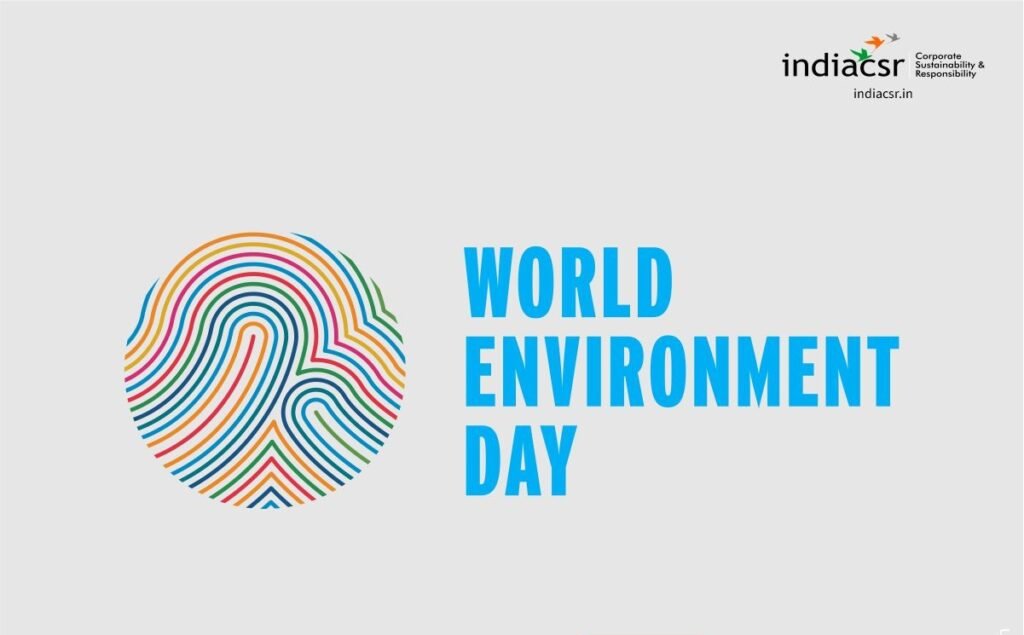A mere 10% of India’s logistics sector falls under the organized category.

World Environment Day is celebrated every year on June 5 to raise awareness and action for the protection of our environment. The theme for World Environment Day 2023 is Mission LiFE, which stands for Lifestyle for Environment. The aim is to encourage people to adopt sustainable lifestyle practices that can reduce their environmental footprint and contribute to the global efforts to combat climate change, biodiversity loss, pollution and waste. Mission LiFE or Lifestyle for Environment is a strategic endeavour to improve the competitiveness of Indian goods, enhance economic growth and increase employment opportunities.
Significance of India’s Logistic Sector
Any thriving economy fundamentally relies on an efficient logistics system as its backbone. Logistics, serving as the backbone of India’s international commerce, facilitates the diversification of the country’s exported goods as well as the assortment of products produced within the nation. Over 22 million individuals in India earn their living through employment in the logistics sector has a significant role to play in achieving Mission LiFE.
As per the latest EY study titled “India@100: Realizing the Potential of a US$26t Economy”, India is forecasted to reach a substantial US$26 trillion by Fiscal Year 2048. Serving as the spine of this swift and substantial growth over the forthcoming quarter of a century, in the next 25 years, India’s transportation and logistics sector is perfectly positioned to drive this imminent economic surge.
India, the 5th largest economy in the world, had improved its standing in the World Bank’s logistics ranking by leaping up 6 places to Rank 38 out of 139 countries in the 7th edition of the Logistics Performance Index (LPI 2023).
India sets its sights on achieving a $5 trillion economy by the fiscal years 2024-25. Back in September 2022, the National Logistics Policy (NLP) was unveiled by the Prime Minister, serving as a framework for States and Union Territories intending to draft their logistics policies. Since then, 19 States and Union Territories have announced their respective logistics policies.
Challenges
A mere 10% of India’s logistics sector falls under the organized category. However, the sector also faces many challenges and uncertainties due to the Covid-19 pandemic, rapid urbanisation, increasing congestion and pollution, rising fuel prices and changing consumer preferences. The transport sector of India is the third most greenhouse gas (GHG) emitting sector and accounted for 14 per cent of our energy-related CO2 emissions.
Therefore, it is imperative for the India Logistic Sector to adopt a sustainable lifestyle that can enhance its resilience, competitiveness and profitability while reducing its environmental and social impacts.

What is a sustainable lifestyle for the Logistics Sector?
A sustainable lifestyle for the India Logistic Sector is one that meets the needs of the present without compromising the ability of future generations to meet their own needs. It involves making conscious choices about how to transport goods and services in a way that minimizes the negative impacts on the environment and maximizes the positive ones.

A sustainable lifestyle for the India Logistic Sector can be achieved by following the principles of reduce, reuse and recycle. This means:
Reduce: The sector should reduce its demand for transport by optimizing its network design, route planning, load consolidation and inventory management. It should also reduce its dependence on fossil fuels by switching to cleaner and renewable energy sources such as electricity, biofuels and hydrogen.
Reuse: The sector should reuse its assets and resources by extending their life span, maintaining them properly and sharing them with other stakeholders. It should also reuse its packaging materials by adopting reusable or returnable containers and pallets.
Recycle: The sector should recycle its waste and emissions by recovering and transforming them into new products or materials. It should also support the circular economy by integrating reverse logistics, waste management and recycling into its operations.
Why is a sustainable lifestyle important for the Logistics Sector?
A sustainable lifestyle is important for the India Logistic Sector because it can help it to:
- Protect the environment: By reducing its transport demand and emissions, the sector can conserve natural resources, mitigate climate change, prevent pollution and preserve biodiversity.
- Save money: By reusing and recycling its assets and resources, the sector can reduce its operational costs and generate revenue from selling or exchanging them.
- Improve performance: By switching to cleaner and renewable energy sources, the sector can improve its fuel efficiency, reliability and safety.
- Enhance customer satisfaction: By optimizing its network design, route planning, load consolidation and inventory management, the sector can improve its service quality, delivery speed and accuracy.
- Increase competitiveness: By adopting reusable or returnable packaging materials, the sector can reduce its packaging costs and waste disposal fees.
- Create opportunities: By supporting the circular economy, the sector can create new markets, products and services that can cater to the changing consumer preferences and regulatory requirements.

How can the Logistics Sector adopt a sustainable lifestyle?
Adopting a sustainable lifestyle may seem challenging or inconvenient at first, but it can be easy and rewarding if the sector follows some simple steps:
Assess its current lifestyle: The sector can use online tools or calculators to measure its environmental footprint and identify areas where it can improve.
Set realistic goals: The sector can start with small changes that are feasible and affordable for it, such as installing LED lights, using GPS devices or carrying reusable bags.
Seek information and inspiration: The sector can learn more about the benefits and best practices of a sustainable lifestyle from reliable sources such as books, websites or documentaries. It can also get inspired by the examples of others who have successfully adopted a sustainable lifestyle in the logistic sector.
Join or create a community: The sector can connect with like-minded stakeholders who share its values and vision for a sustainable lifestyle. It can join or create groups or networks that offer support, advice or opportunities for collaboration.
Celebrate its achievements: The sector can track its progress and celebrate its achievements by rewarding itself or sharing its stories with others.

Conclusion
Mission LiFE is a call for action for all of us to adopt a sustainable lifestyle that can protect our environment and improve our quality of life. It is not only a moral duty but also a smart choice that can benefit us in many ways. The India Logistic Sector has a significant role to play in achieving Mission LiFE by transporting goods and services in a way that minimizes its environmental footprint and maximizes its positive impacts. Let us join hands and make World Environment Day 2023 a milestone for achieving Mission LiFE.

About the Author
Dr. Pushpendra Pratap Singh, Philanthropist I Corporate Strategist, Country Head – Asia Shipping International Transport
Views are personal.
Source:
- https://www.investindia.gov.in/team-india-blogs/national-logistics-policy-india
- https://www.pmindia.gov.in/en/news_updates/pm-launches-national-logistics-policy/
- https://www.ey.com/en_in/consulting/transforming-the-future-of-indian-logistics-sector
- https://pib.gov.in/PressReleseDetail.aspx?PRID=1919925
- https://timesofindia.indiatimes.com/blogs/voices/why-india-needs-to-streamline-logistics-sector/
- https://indiacsr.in/sustainable-and-responsible-logistics-key-to-socio-economic-development/
- https://www.niti.gov.in/sites/default/files/2022-10/Brochure-10-pages-op-2-print-file-20102022.pdf
- https://www.niti.gov.in/decarbonising-transport-redefining-mobility-policies-india







